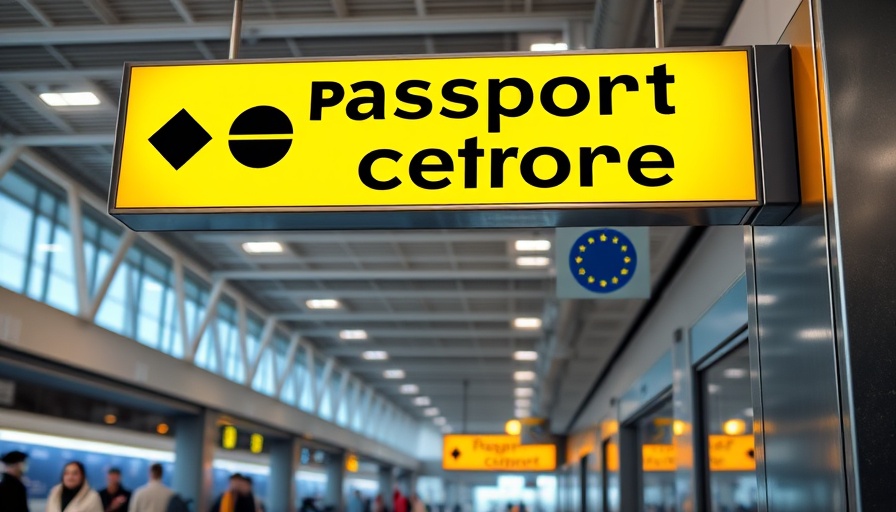
New Immigration Regulations: What You Need to Know
On May 12, 2025, the UK government unveiled significant reforms to its immigration system through a white paper released by the Labour government. Among the most notable changes are increased qualifications and heightened language requirements. The new measures reflect a larger trend towards tightening immigration policies in developed nations, a response not only to changing job market landscapes but also to public sentiment surrounding immigration.
Impact on Skilled Workers and Hospitality Sector
One of the biggest shifts in the new immigration policy is the elevation of qualifications needed for skilled workers to RQF 6, equivalent to graduate level. This redefinition raises the barriers for entry and narrows the range of eligible professions. A Temporary Shortage List has been created that will allow limited access to the Points-Based Immigration System for roles not meeting these new thresholds. Essentially, only jobs with long-term shortages will qualify, as determined by the Migration Advisory Committee and contingent on employers demonstrating commitment to domestic hiring.
Kate Nicholls, CEO of UKHospitality, has expressed grave concerns about these changes. She pointed out that less than 10% of roles in hospitality are currently eligible for skilled worker visas. With the tightening of qualifications, this percentage is likely to shrink even further, exacerbating the existing struggles of the hospitality industry to attract and retain skilled talent from abroad. This could stifle innovation and excellence in hotels and restaurants, which rely heavily on diverse and skilled personnel from various cultural backgrounds.
Broader Implications for Luxury Travel
For affluent travelers, these regulatory changes could have a cascading effect on the luxurious experiences offered in the UK. Tightened immigration laws might lead to fewer skilled chefs, sommeliers, and hospitality managers, which could subsequently diminish service quality in high-end hotels and 5-star resorts. Exclusive resorts, luxury spa retreats, and boutique luxury hotels may find themselves at a disadvantage without chefs and staff who excel in high-pressure environments.
Consider the rise of luxury travel trends, such as culinary experiences, personalized services, and unique cultural immersions. As luxury travelers seek out exclusive travel accommodations, the intricacies of staffing will play a crucial role in shaping their experiences. If skilled labor continues to dwindle, the standard of service widely expected in private island resorts and luxury beach retreats could falter.
Future Predictions for the Luxury Market
Looking ahead, the luxury travel market may need to adapt to these immigration reforms through innovative strategies. One possibility could involve developing more robust training programs that focus on local talent development, thus meeting the needs of high-end hotels without relying on overseas hiring.
Moreover, the increased costs associated with hiring skilled workers may eventually lead to higher prices for luxury services—further reshaping the market landscape as hotels and resorts try to balance cost and quality. Luxury honeymoon resorts and exclusive travel experiences might have to recalibrate their offerings to maintain value while ensuring excellence in service.
Bridging Cultural Gaps: The Role of Community
This tightening of immigration may also influence how cultural exchanges occur within the hospitality sector. Many luxury resorts have thrived on their ability to share diverse cultural experiences. When the pool of workers is restricted, the rich tapestry of cultural influences that create memorable guest experiences could diminish.
Furthermore, the hospitality industry historically plays a vital role in connecting different communities, promoting understanding through shared experiences. As immigration policies become more stringent, hotels and resorts will need to find creative ways to preserve this ethos, perhaps focusing more on domestic culinary talents or regional artists to enhance their services.
Call to Action: The Future of Luxury Travel
As these changes unfold, affluent travelers are encouraged to stay informed and consider how these developments might affect their future travel plans. Understanding the intricacies of the hospitality landscape can lead to more meaningful travel experiences. Be sure to explore unique offerings from luxury villas and resorts with a focus on local culture, quality service, and sustainable practices.
In a world that is constantly changing, it is essential to support those who prioritize inclusivity and cultural richness in travel accommodations. As travelers, we have the power to influence these trends—so let’s advocate for a tourism industry that embraces diversity and excellence.
 Add Row
Add Row  Add
Add 




Write A Comment